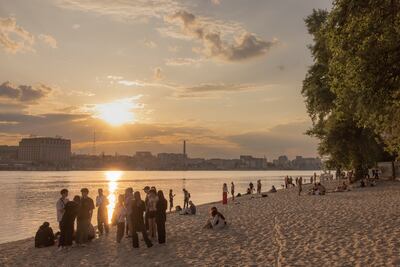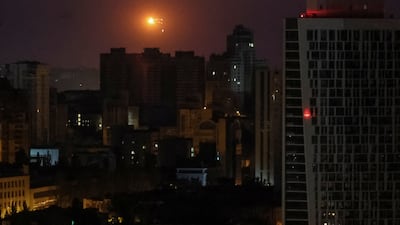It’s deja vu every night. You go to bed at a reasonable hour and, because you’re exhausted, fall asleep in no time. The next thing you know a huge wall of sound is wailing through the window, followed by another just behind it, and a third just behind that.
Blinking awake in the pitch-black night, you’ve suddenly got three rhyming air-raid sirens – so loud they seem to be coming from everywhere at once – letting you know a Russian assault is on the way. You’ve got 10-15 minutes before the projectiles arrive, whether it’s drones or missiles.
This is pre-dawn life in the Ukrainian capital today. In recent weeks, Ukraine’s air defences have been able to neutralise most of the projectiles, but still you’ve got a decision to make.
You might be so tired you can’t be bothered, and just roll over, pull the pillow over your head and endeavour to return to dreamland. It’s a bold move likely to end in failure. Trust me, you’ll spend the next hour silently cursing decision-makers for starting this war and the folks who invented kamikaze drones and wondering whether your time has come.
If you’re an amateur filmmaker with a skyline view, you might grab your phone and head to the window or terrace to record the show. Not exactly the safest option, but who said viral fame would be easy? Kyiv Mayor Vitali Klitschko last week, in fact, urged residents against this after a woman in the city’s Holosiivskyi district was struck and killed on her balcony.
The most common response is to move away from the windows and put several walls between you and the potential arriving fire. Some folks head to the bathroom and lay down in the tub. If the blasts seem relatively close, I’ll probably end up in the stairwell, hope-scrolling on my phone to find out what exactly is incoming and where.

But I have only myself to protect. Those with children tend to take greater precautions, especially when the booms get too close for comfort. During the first major round of Russian assaults on Kyiv last fall, many frightened locals, including yours truly, regularly hurried into metro stations and basements to take shelter when the air-raid sirens rang out.
However, once we knew the attacks were focused on degrading infrastructure, most people took to ignoring them and going about their business. All that has changed over the past fortnight as the Kremlin has launched a seemingly endless barrage. A month ago, I detailed how the heavy fighting seemed set to return, and that’s since been borne out.
Over a 36-hour period early last week, Russia launched nearly 90 projectiles at Kyiv, including Iskander ballistic missiles, cruise missiles and Shahed drones. Friends who have stayed in the capital throughout the war say they are finally truly fearful of their safety and have thought about leaving, or at least taking regular shelter.
So it was last Thursday for Yaroslav Riabchuk and his wife and daughter, who hurried outside in the pre-dawn hours to shelter in the basement of a nearby clinic. Yet, probably because so few people have used the shelters in recent months, the clinic was locked.
The Riabchuks and others banged on the doors, pleading to be let in, as Russian missiles streaked across the sky above. Riabchuk rushed around the building to find another entrance, then felt a huge blast. Ukraine’s defences had intercepted a Russian missile overhead, raining glass and debris on those below.
“It was chaos. My daughter was screaming. Everyone was screaming,” Riabchuk later said. His wife had been hit. “I tried to help her … but it was too much blood.”
Three people were killed in that assault, which arrived just a couple of days after nearly a dozen missiles had struck Kyiv in the middle of a clear, sunny day. That attack was all the more shocking because the Ukrainian capital has felt like another universe while the sun is up.
Kyivans have seemed to revel in these early summer days, with an assault-fuelled unity somehow making the city feel more vibrant. Maybe it’s the greater the threat, the more dear something becomes. I’m reminded of what a journalist friend wrote years ago about living in a city facing impending catastrophe. She described “a mood of dread, but also of astonishing vitality – economic, creative, artistic”.
That’s Kyiv today. The International Monetary Fund last week boosted its estimate for Ukraine’s economy, saying that Ukrainian businesses have been incredibly resilient and that GDP could grow as much as 3 per cent this year.

People smile at each other on the street and in the park. On the weekend, I visited a crowded beach where young men and women played volleyball, swam, sunbathed, chatted and bounced to techno. “You’ve got to live while you can,” a Ukrainian friend said as we elbowed through the crowd on the Klitschko Glass Bridge on the weekend. Ukrainian artists are producing popular songs, even whole albums, about staying strong and resisting in occupied territories.
There’s a sense that we’re all in this together, and everybody’s willing to pitch in. One Ukrainian soldier recently laid out on Instagram instructions for surviving Russia’s overnight assaults. The solution involved naps, hugs, exercise, relaxation, and quality time with loved ones – a good recipe for a joyful life even without the war.
But then, always, there are the nights – a darker vision of Bill Murray’s situation in Groundhog Day: rather than going to sleep and waking up in the previous day, you go to sleep and wake up in a nightmare. And what, I keep wondering, is the Russian objective?
Analysts argue that Moscow aims to erode Ukraine’s air defences in advance of its long-expected counter-offensive. A reasonable goal, but Russia is also eroding its own supply of missiles and drones, so any advantage gained would be minimal at best. It's also given Ukraine the chance to improve: the past few nights in Kyiv we’ve heard the air-raid sirens but no booms because the country’s air defences intercepted all the incoming projectiles beyond the city’s fringe.
Having drinks with a Ukrainian friend the other night, she pointed out that perhaps Russia’s one advantage right now is its unpredictability. “We really don’t know what they’ll do next, and we rarely know why they do things,” she said.
And that might be as good an explanation as any. The simple terror of the unknown: monsters lurking in the darkness and things that go bump in the night. Maybe Russia aims to erode Ukraine’s defences. Maybe it hopes to break its will. Maybe there’s no rhyme or reason behind it – which could be the scariest scenario of all.



